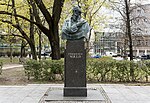Sejm

The Sejm (English: Seym, Polish: [sɛjm] (listen)), officially known as the Sejm of the Republic of Poland (Polish: Sejm Rzeczypospolitej Polskiej), is the lower house of the bicameral parliament of Poland. The Sejm has been the highest governing body of the Third Polish Republic since the transition of government in 1989. Along with the upper house of parliament, the Senate, it forms the national legislature in Poland. The Sejm is composed of 460 deputies (singular deputowany or poseł – "envoy") elected every four years by a universal ballot. The Sejm is presided over by a speaker called the "Marshal of the Sejm" (Marszałek Sejmu). In the Kingdom of Poland, the term "Sejm" referred to an entire two-chamber parliament, comprising the Chamber of Deputies (Polish: Izba Poselska), the Senate and the King. It was thus a three-estate parliament. The 1573 Henrician Articles strengthened the assembly's jurisdiction, making Poland a constitutional elective monarchy. Since the Second Polish Republic (1918–1939), "Sejm" has referred only to the larger house of the parliament.
Excerpt from the Wikipedia article Sejm (License: CC BY-SA 3.0, Authors, Images).Sejm
Wiejska, Warsaw Śródmieście (Warsaw)
Geographical coordinates (GPS) Address Website Nearby Places Show on map
Geographical coordinates (GPS)
| Latitude | Longitude |
|---|---|
| N 52.2252 ° | E 21.028 ° |
Address
Sejm RP
Wiejska 4/6/8
00-902 Warsaw, Śródmieście (Warsaw)
Masovian Voivodeship, Poland
Open on Google Maps










